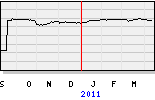
Dutch biopharmaceutical company Crucell N.V. (Euronext, Nasdaq: CRXL; Swiss Exchange: CRX) announces that the journal Science today published a study showing why Crucell's novel anti-influenza antibody is so effective against such a broad range of influenza virus subtypes. These characteristics make the Crucell antibody CR6261 a potentially revolutionary therapy against seasonal and pandemic flu.
"A new therapy for the often deadly flu virus is much needed", says Jaap Goudsmit, CSO of Crucell. "The continuous mutation of the influenza virus means that vaccine developers are always playing catch-up when it comes to choosing the correct virus. In addition, these vaccines tend to perform less effectively in the elderly. The almost universal oseltamivir resistance of the H1N1 virus presently circulating and the reported cases of H5N1 oseltamivir-resistance illustrate the urgency for a universal therapy against flu."
Crucell showed that the antibody CR6261 is effective in preventing as well as treating influenza caused by a broad range of seasonal and potentially pandemic influenza strains in the most stringent pre-clinical models suitable for human influenza. The study, conducted by Crucell together with The Scripps Research Institute, used x-ray crystallography to image and understand why the antibody can bind to and neutralize such a wide variety of influenza viruses. The study looked at the H1 strains that return every winter as well as the avian H5 ('bird flu') strains that are endemic in Asia which today pose a pandemic threat.
Influenza and related medical complications result in an estimated number of 500,000 annual deaths worldwide. Every year more than 200,000 people in the United States are hospitalized from flu complications and about 36,000 people die from flu[1]. The number of flu-related hospitalizations by far exceeds the number of flu-related deaths. While flu affects individuals of all ages, elderly above the age of 65 constitute approximately 90% of flu-related deaths. Young children and individuals with chronic medical conditions also have a higher risk of influenza and related complications. Today vaccination is the cornerstone for preventing influenza, with the flu vaccine market of $2.2 billion in size and estimated to double by 2016.
Each year circulating strains of influenza virus subtypes, currently H1 and H3, change the composition of the viral surface protein known as hemagglutinin by mutation. Consequently, if one has had a vaccination against influenza this year, the antibodies produced by the immune system will most likely not protect against next years' flu. If an antibody was able to recognize an invariable structure in the hemagglutinin protein, such an antibody could be applied for the prevention and therapy of influenza caused by a wide variety of flu strains.
The unique property of the Crucell antibody appears to be related to its mechanism of action. The paper published in Science entitled "Antibody Recognition of a Highly Conserved Influenza Virus Epitope" shows that the CR6261 antibody attacks the 'Achilles heel' of the influenza virus, a region in the invariable part of the hemaglutinin protein that is key for the virus to start replication once it has infected an individual. The Science paper shows that the antibody neutralizes the influenza virus by blocking the fusion of the virus with membranes inside the host's cell, thereby effectively preventing replication of the virus. These results are a revolutionary discovery for the potential development of an effective therapy of, and prevention against, seasonal and pandemic influenza.
"Having successfully developed the first antibody therapy against rabies, which is now in Phase II fast-track clinical development, we are determined to develop an antibody therapy for flu. Recently we expanded our set of influenza antibodies by discovering antibodies targeting also the H3 seasonal influenza strains, says Ronald Brus, CEO of Crucell."
Patents for these antibodies have been filed worldwide, based on the first filing date of September 7, 2006. The claims encompass the unique conserved region to which the antibodies bind, the unique features of the neutralizing antibodies, their mode of binding, as well as their use in diagnosing, treating and preventing influenza virus infection and associated symptoms.
The results of this study will be presented by Dr Robert Friesen, Crucell's Vice President Antibody Discovery, at the 8th Asia Pacific Congress of Medical Virology, on the 27th of February 2009 in Hong Kong.
Forward-looking statements
This press release contains forward-looking statements that involve inherent risks and uncertainties. We have identified certain important factors that may cause actual results to differ materially from those contained in such forward-looking statements. For information relating to these factors please refer to our Form 20-F, as filed with the U.S. Securities and Exchange Commission on May 7, 2008, in the section entitled 'Risk Factors'. The Company prepares its financial statements under International Financial Reporting Standards (IFRS).
About The Scripps Research Institute
The Scripps Research Institute is one of the world's largest independent, non-profit biomedical research organizations, at the forefront of basic biomedical science that seeks to comprehend the most fundamental processes of life. Scripps Research is internationally recognized for its discoveries in immunology, molecular and cellular biology, chemistry, neurosciences, autoimmune, cardiovascular, and infectious diseases, and synthetic vaccine development. Established in its current configuration in 1961, it employs approximately 3,000 scientists, postdoctoral fellows, scientific and other technicians, doctoral degree graduate students, and administrative and technical support personnel. Scripps Research is headquartered in La Jolla, California. It also includes Scripps Florida, whose researchers focus on basic biomedical science, drug discovery, and technology development. Scripps Florida is currently in the process of moving from temporary facilities to its permanent campus in Jupiter, Florida. Dedication ceremonies for the new campus will be held February 26 - 28, 2009.
